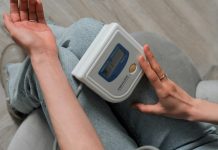
A new study from Brigham researchers has uncovered a significant correlation between insomnia symptoms and the development of hypertension, particularly in women.
Published in the journal Hypertension, this research from the Channing Division of Network Medicine of Brigham and Women’s Hospital emphasizes the crucial role of quality sleep in maintaining good health.
Lead researcher Shahab Haghayegh, Ph.D., of Brigham and Harvard Medical School, points out the potential risk of hypertension in individuals experiencing symptoms of insomnia.
With hypertension being a precursor to several health complications, early identification and treatment of high blood pressure become imperative.
The study follows the worrying trend of increasing hypertension and sleep disorders among US adults.
The Centers for Disease Control and Prevention note that over 35% of US adults are sleep-deprived, while the American Academy of Sleep Medicine reports that 30% of Americans show symptoms of insomnia.
These figures align with the staggering statistic that 45% of U.S. adults suffer from high blood pressure.
The research involved following 66,122 participants, aged between 25 and 42, from the Nurses’ Health Study II (NHS2) cohort over sixteen years (2001 to 2017).
All participants were free of hypertension at the beginning of the study. The study meticulously collected data on various factors, including sleep duration and sleep-related difficulties.
Key findings from the data analysis revealed that women with sleeping difficulties generally had higher BMIs, engaged in less physical activity, and had poorer diets. They were also more likely to smoke, consume alcohol, and have undergone menopause.
The study found that women sleeping less than seven to eight hours per night or those experiencing trouble falling or staying asleep were at a significantly higher risk of developing hypertension.
Interestingly, waking up early was not linked to this increased risk. These findings held true even after accounting for variables like shift work schedules and individual chronotype (morning or evening preference).
Haghayegh highlighted that while the exact nature of the relationship between sleep difficulties and hypertension risk is not fully understood, it is known that poor sleep can lead to physiological changes that might contribute to hypertension.
This includes increased sodium retention, arterial stiffness, and changes in vascular tone.
One limitation of the study is its focus solely on women, with plans to include men and non-binary participants in future research.
Additionally, sleep quality data were collected only at specific points during the study. However, the study’s strengths lie in its large participant number and the lengthy follow-up period.
Haghayegh emphasizes that the findings do not establish causality but rather an association between sleep and hypertension. Future clinical studies are planned to explore whether sleep medications could positively impact blood pressure.
The research underscores the importance of quality sleep for overall well-being, reinforcing the recommendation by the American Academy of Sleep Medicine to get at least seven hours of sleep per night.
For those struggling with sleep, exploring the underlying causes could be crucial, as this study highlights another significant health reason to prioritize a good night’s sleep.
If you care about blood pressure, please read studies about Popular blood pressure pill could cause problems and findings of Common blood pressure drugs and memory trouble: a plain talk.
For more information about health, please see recent studies about 5 medicines to treat high blood pressure, and results showing diets high in flavonoids could help reduce stroke risk.
The research findings can be found in Hypertension.
Copyright © 2023 Knowridge Science Report. All rights reserved.



